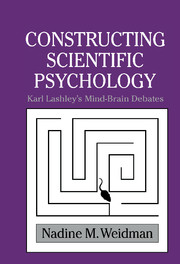Book contents
- Frontmatter
- Contents
- Preface
- Acknowledgments
- List of abbreviations
- Introduction
- 1 Lashley and Jennings: The origins of a hereditarian
- 2 Lashley, Watson, and the meaning of behaviorism
- 3 The pursuit of a neutral science
- 4 Neuropsychology and hereditarianism
- 5 Psychobiology and Progressivism
- 6 Psychobiology and its discontents: The Lashley-Herrick debate
- 7 Hull and psychology as a social science
- 8 Intelligence testing and thinking machines: The Lashley-Hull debate
- 9 Pure psychology
- 10 Public science and private life
- 11 Genetics, race biology, and depoliticization
- Epilogue: Lashley and American neuropsychology
- Appendix: Archives holding Lashley material
- Bibliography
- Index
6 - Psychobiology and its discontents: The Lashley-Herrick debate
Published online by Cambridge University Press: 16 September 2009
- Frontmatter
- Contents
- Preface
- Acknowledgments
- List of abbreviations
- Introduction
- 1 Lashley and Jennings: The origins of a hereditarian
- 2 Lashley, Watson, and the meaning of behaviorism
- 3 The pursuit of a neutral science
- 4 Neuropsychology and hereditarianism
- 5 Psychobiology and Progressivism
- 6 Psychobiology and its discontents: The Lashley-Herrick debate
- 7 Hull and psychology as a social science
- 8 Intelligence testing and thinking machines: The Lashley-Hull debate
- 9 Pure psychology
- 10 Public science and private life
- 11 Genetics, race biology, and depoliticization
- Epilogue: Lashley and American neuropsychology
- Appendix: Archives holding Lashley material
- Bibliography
- Index
Summary
I have found discussion with most of the radical behaviorists futile. We seem to speak different languages – common words do not mean the same to us …
Charles Judson HerrickRats are not men. … Men are bigger and better than rats.
Charles Judson HerrickWhen Lashley arrived at the University of Chicago in 1929, he associated himself with a group of scientists whose work was permeated with the hope for human betterment. He had been recruited to the department of psychology at Chicago in order to help advance the program in “psycho-neurology,” the integration of psychology and biology envisioned by Herrick and his colleagues. While Lashley supported the American school's goal of unifying the sciences of brain and behavior, he became deeply opposed to their Progressive social ideals. He adopted their general embryological perspective, and Child's gradient theory in particular, but consistently rejected the implications of progress that were supposed to go along with it.
Lashley and Embryology
Lashley's use of the embryological model in his own work correlating brain function and behavior did not spring up instantaneously upon his arrival in Chicago. As early as 1917 he had been self-consciously borrowing terms from that field. References to Child's gradient theory, however, began to appear in Lashley's work only in 1926 and continued until 1935, when Lashley left Chicago for Harvard.
- Type
- Chapter
- Information
- Constructing Scientific PsychologyKarl Lashley's Mind-Brain Debates, pp. 105 - 118Publisher: Cambridge University PressPrint publication year: 1999



